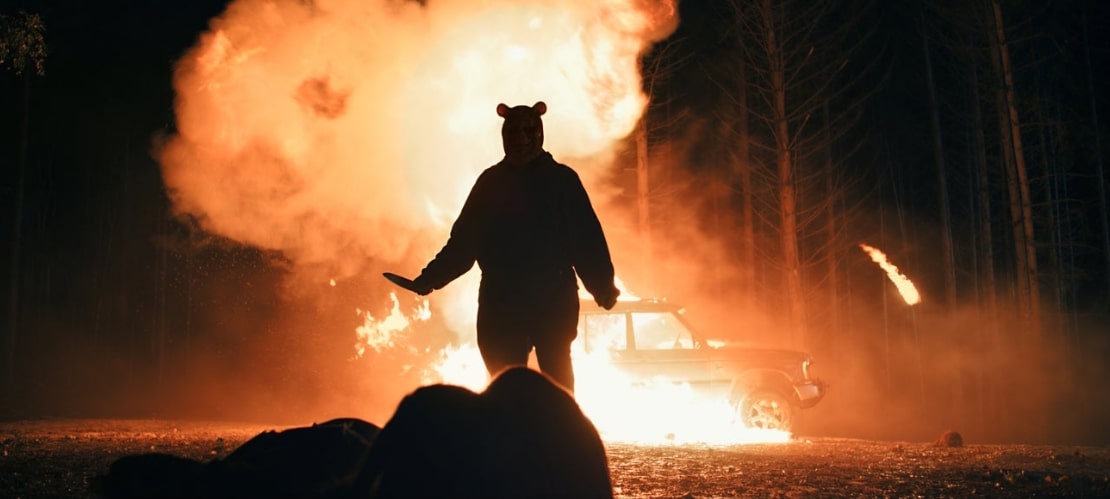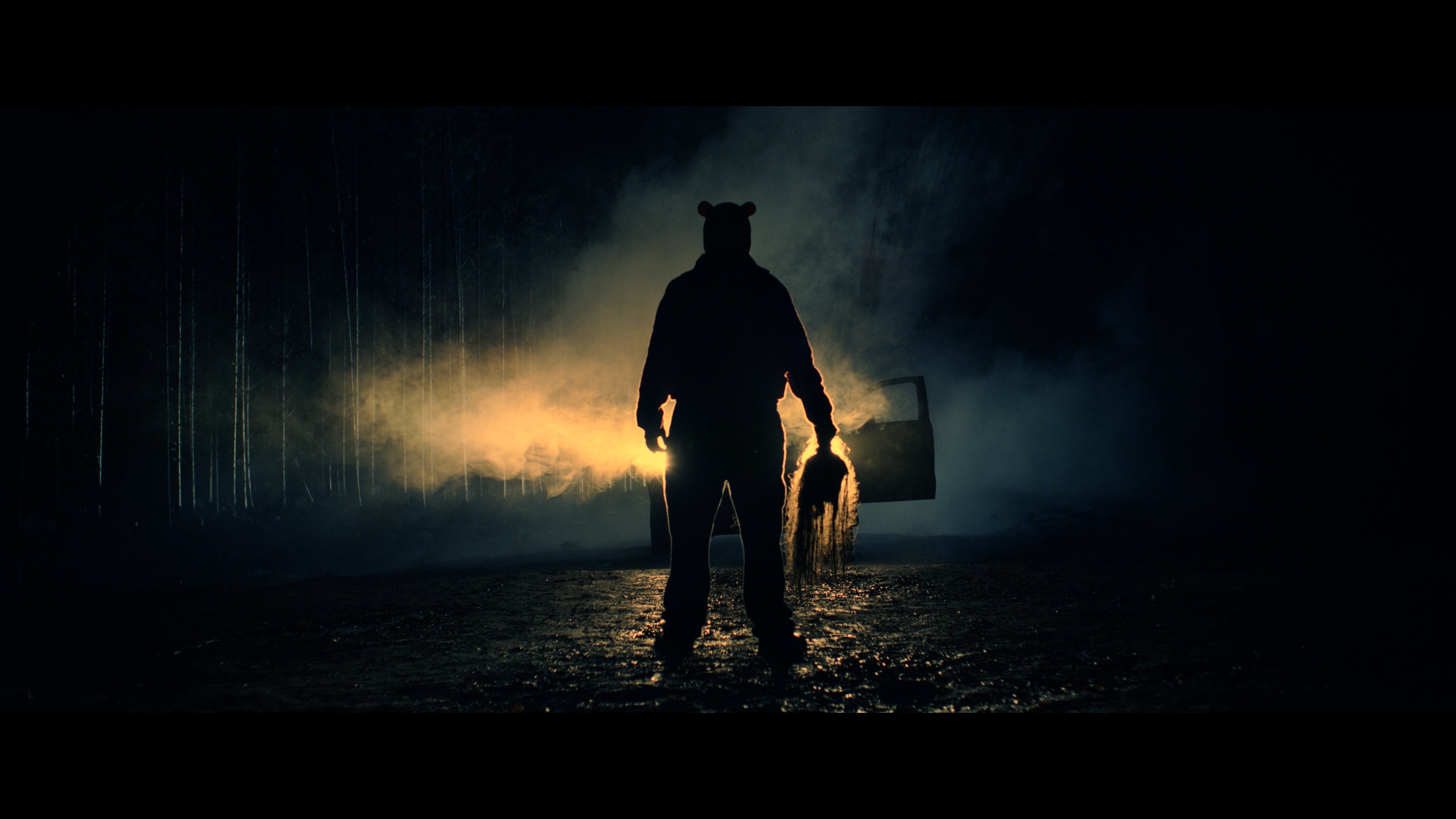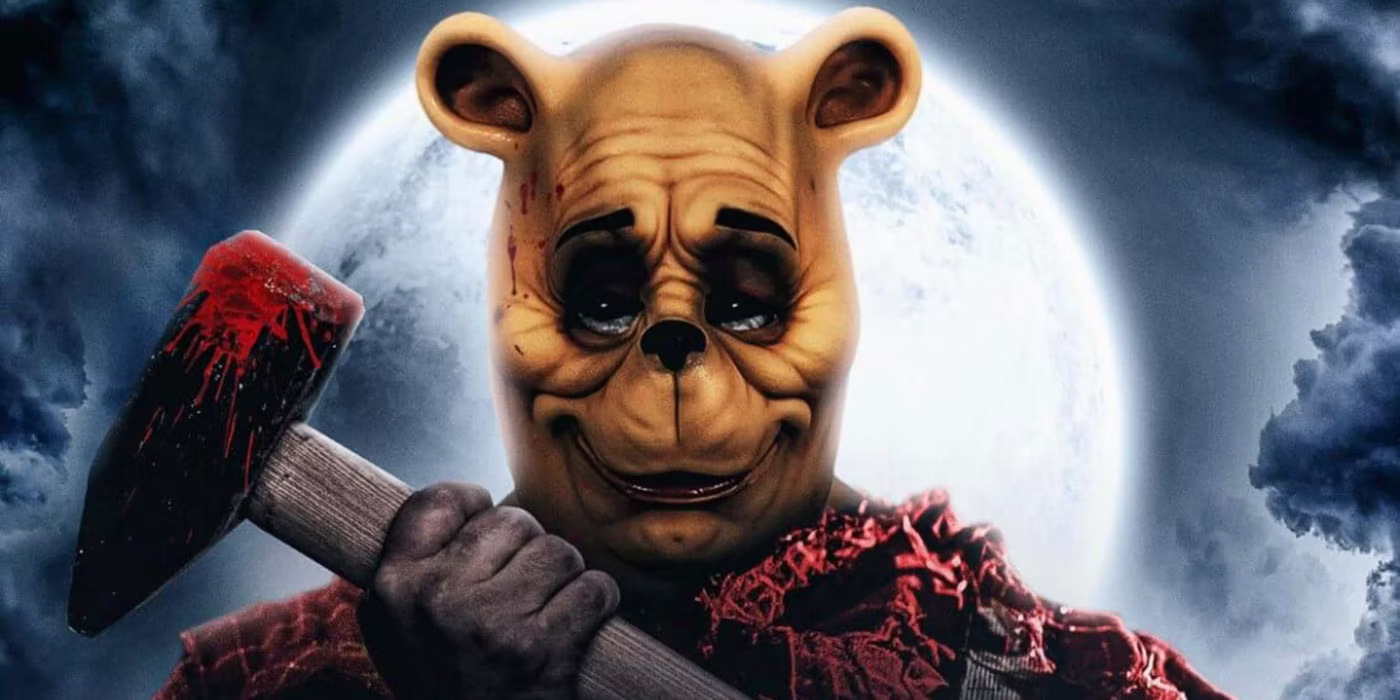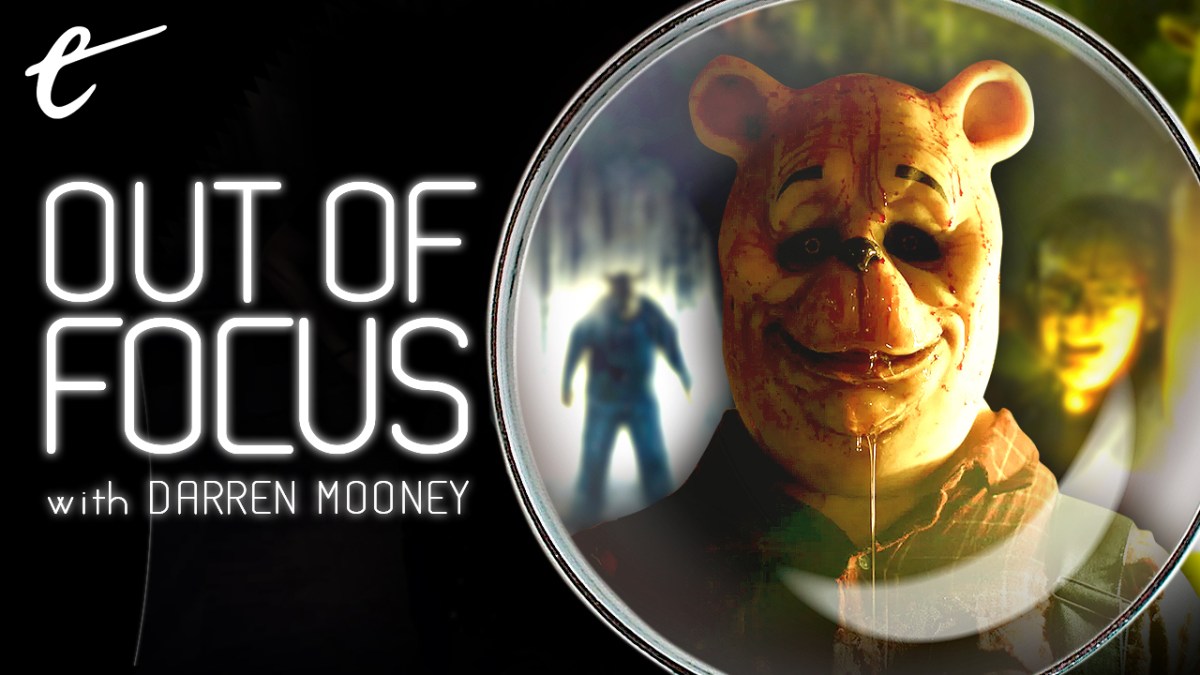There is a popular quote attributed to both Fredric Jameson and Slavoj Žižek arguing that it is “easier to imagine the end of the world than the end of capitalism.” It is an odd thought to process while watching Rhys Frake-Waterfield’s Winnie the Pooh: Blood and Honey, a schlocky horror film that reimagines A. A. Milne’s loveable anthropomorphic teddy bear as a hack-and-slash movie monster. Still, it’s something that bubbles through the film’s very existence.
Blood and Honey can be understood in a couple of different contexts. Most obviously, it is a transgressive horror film that uses the iconography of beloved childhood figures in a grotesque and unsettling way as a shortcut to cheap thrills. There has been a recent spate of these movies, including The Banana Splits Movie and The Mean One. Later this year, Five Nights at Freddy’s will adapt the beloved video game, riffing on the same basic idea of cute childish things turned violent.
However, Blood and Honey stands apart from these contemporaries. It isn’t a pastiche like Five Nights at Freddy’s, it isn’t a licensed production like The Banana Splits Movie, and it’s not an unauthorized parody like The Mean One. It is an adaptation of A. A. Milne’s beloved children’s classic, made possible by the fact that Winnie the Pooh has entered the public domain. Nobody has to pay to use the character, and no authority has the power to veto what can be done with him.
Copyright law is an interesting thing. The Copyright Act of 1790 enshrined legal protection of an author’s right to their work for “the term of fourteen years from the recording the title thereof in the clerk’s office.” However, that period of protection would be expanded over the ensuing centuries. With the Copyright Term Extension Act, arriving in 1998, that protection was extended to the life of the author plus another seven decades.
Of course, the reality is that copyright doesn’t always protect the artists. It often exists to enrich corporate entities. Much of the most lucrative intellectual property on the planet is controlled by faceless companies that ruthlessly exploit the artistry of their employees and contractors. Comic book movies are a billion-dollar industry, but key creative figures have to fundraise to pay medical bills, like Bill Mantlo. Creators like Jack Kirby or Bill Finger never got to enjoy the spoils of their labor.

Indeed, these extensions to the period of copyright were largely driven by companies holding these intellectual property rights. The Copyright Term Extension Act was known in some circles as the “Mickey Mouse Protection Act,” reflecting Disney’s proactive lobbying in favor of the extension. Incidentally, Disney paid $350 million to buy Winnie the Pooh from the A. A. Milne estate in March 2001. It is ruthless capitalism, rooted in these companies’ desires to control the public imagination.
The Copyright Term Extension Act ensured that no media entered the public domain between 1998 and 2019. As much as writers like Grant Morrison might argue that superheroes are the modern equivalent to the classic Greek gods, this ignores the fact that mythology is a public resource. The classic myths were not owned by large corporations that could use the threat of legal action to pull Vera Drew’s The People’s Joker from the Toronto International Film Festival after a single screening.
This makes Blood and Honey a pointed act of transgression. The film comes from writer and director Rhys Frake-Waterfield, best known as a producer of low-rent schlock like Dinosaur Hotel and Dragon Fury. Realizing that A. A. Milne’s beloved childhood fable was entering the public domain, Frake-Waterfield sensed an opportunity. With a budget of under $100,000, he set out to make a quick cash-in slasher movie.
Of course, Frake-Waterfield could only draw from elements included in the earliest stories. He had to avoid the iconic material added to the mythos in the years that followed. “Only the 1926 version is in the public domain, so those were the only elements I could incorporate,” Frake-Waterfield admitted. “Other parts like Poohsticks, and Tigger, and Pooh’s red shirt — those aren’t elements I can use at the moment because they’re the copyright of Disney and that would get me in a lot of trouble.”
Blood and Honey is a bad movie. It is lazy, uninspired, and boring. It has no sense of character, theme, or basic structure. It’s a lazily reskinned version of Halloween or The Texas Chainsaw Massacre from a filmmaker who spent a significant portion of the press tour passive-aggressively complaining about how Halloween Ends took “itself too seriously.” There is nothing of any merit here, nothing to hold the audience’s interest. The film’s 84-minute runtime lasts several lifetimes.
That said, there is a germ of an interesting idea in the central concept, which has an adult Christopher Robin (Nikolai Leon) returning to the childhood fantasy that he abandoned to go to college. He discovers that his childhood did not take well to this abandonment. Winnie the Pooh (Craig David Dowsett), now a feral and mute beast, chains Christopher up and tortures him. He whips the adult with Eeyore’s tail. However, Winnie the Pooh cannot kill Christopher. He must possess him.

It is too much to suggest that this plot is mirrored in the story of the film’s actual protagonist and decoy final girl, Maria (Maria Taylor). Maria is taking a trip into the country with her girlfriends, recovering from a traumatic experience with a male stalker (Chris Cordell). When Maria’s friend Lara (Natasha Tosini) spots Pooh lurking around the Airbnb, she assumes that he must be Maria’s stalker. Pooh’s psychopathic sidekick, Piglet, is also played by Cordell, to underscore this connection.
At times, Blood and Honey seems like it might be a clever and subversive commentary on the way in which so much modern pop culture infantilizes its audience. Christopher has tried to grow up and leave his childhood behind, even planning to marry his fiancée Mary (Paula Coiz), but his childhood won’t leave him behind. Pooh needs Christopher, his validation and his love. However, that relationship is not as innocent as it appears framed through childhood memory.
Many modern adults would empathize with this idea, as their childhood nostalgia is weaponized against them by streaming services and studios. Even if one lives in a remote cabin in the woods, franchises like Star Wars, Teenage Mutant Ninja Turtles, He-Man, and X-Men: The Animated Series are inescapable. Entertainment that was once aimed at children is now aimed at the adults those children became. There is no indication that these corporations are ever going to stop.
Of course, this gives Blood and Honey too much credit, suggesting that it can be read as a subversive commentary on the role that this sort of intellectual property plays in cultural stagnation. In reality, Blood and Honey is an illustration of just how pervasive this model of capitalism can be. Frake-Waterfield isn’t using Pooh to make a point about the cynical exploitation of these cultural touchstones. He is using it as a cynical exploitation of these cultural touchstones.
Blood and Honey grossed nearly $5 million at the global box office, and one suspects that it performed very well on home media and streaming. There is already a sequel in the works with “five times the budget.” More than that, Frake-Waterfield has made a conscious effort to expand the brand into a shared universe built around similar properties. He will direct Peter Pan’s Neverland Nightmare and will produce Bambi: The Reckoning, which was sold to international distributors at Cannes this year.
Frake-Waterfield doesn’t just have his eye on these sequels and spin-offs. He dreams of a bigger childhood horror shared universe. “The idea is that we’re going to try and imagine they’re all in the same world, so we can have crossovers,” he boasted. “People have been messaging saying they really want to see Bambi versus Pooh.” It’s incredibly ruthless and cynical. It is a transparent attempt to build a massive multimedia franchise from elements that the production team don’t have to pay for.

In theory, the liberation of these iconic characters from copyright should herald encourage creativity and ingenuity. It should allow for more projects like The People’s Joker or Apocalypse Pooh. There are certainly artists engaged in that sort of work. It also provides the opportunity for commentary and engagement with the modern media landscape. Last Week Tonight with John Oliver is already salivating at the satirical potential of Mickey Mouse’s entry into the public domain.
Blood and Honey suggests an alternative to these creative uses of works leaving corporate purview. Blood and Honey is just as cynical and ruthless in its exploitation of this intellectual property as Disney had been. Frake-Waterfield is clearly aspiring to exploit these properties in exactly the same way that Disney did, hoping to create a scale model of their production machine. It is a trickle-down shared universe, a reheat of a familiar meal constructed from pre-digested ingredients.
For all the moral handwringing about how the movie “ruined people’s childhoods,” this is the real horror of Blood and Honey. It suggests the limits of creative imagination, an inability to conceive of an alternative to the model of intellectual property management that defines so much contemporary pop culture. The roots of this mode of thinking run so deep that it seems impossible to imagine any alternative. The public domain doesn’t free this intellectual property from endless exploitation, it just means somebody else gets to take a turn.
If the rights to Winnie the Pooh are entering the public domain, why wouldn’t somebody use the brand recognition to make a quick and easy buck? After all, the business logic behind Blood and Honey is the same logic behind something like The Little Mermaid or Ant-Man and the Wasp: Quantumania. People recognize the brand, and that will make it easier to sell. Even this seemingly subversive and rebellious act is just a cheaper, more cynical, and less competent iteration of the larger processes that drive modern media.
All things considered, the cynicism of Blood and Honey is a small price to pay for the possibility of more work like The People’s Joker. More than that, if it helps to undermine or shatter the brand loyalty that these corporations have cultivated among generations of movie-goers, it may serve some purpose. Still, it’s disheartening to watch Blood and Honey, realizing that these modes of exploitation are so deeply ingrained in pop culture that they perpetuate even in the public domain.
Even as the end of copyright becomes a reality, the end of this intellectual property churn remains beyond imagination. Oh bother.






Published: Sep 6, 2023 11:00 am